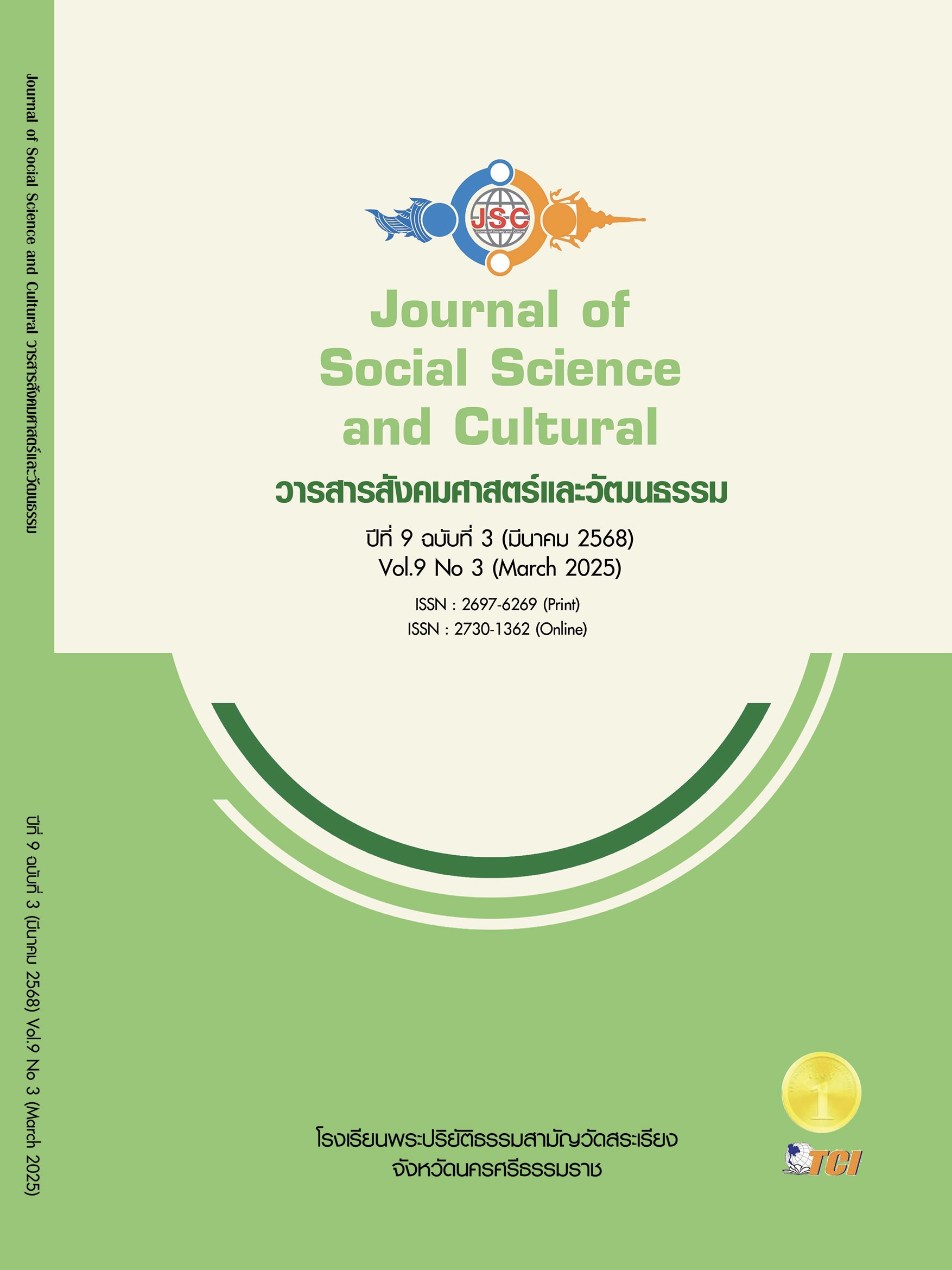CAUSAL FACTORS OF WAREHOUSE TECHNOLOGY MANAGEMENT AFFECTING THE PERFORMANCE OF CENTRAL LOGISTICS WAREHOUSES IN E-COMMERCE IN THAILAND
Main Article Content
Abstract
This research aims to 1) Analyze the causal factors of warehouse technology management affecting operational performance 2) Study the influence of warehouse technology management on warehouse operations and 3) Propose guidelines for managing warehouse technology systems that impact the operations of e-commerce logistics centers. The study employs a mixed-methods approach, collecting data from surveys of 400 logistics warehouse managers in Thailand and in-depth interviews with 12 industry experts. The research utilizes confirmatory factor analysis and structural equation modeling. The findings indicate that the causal factors affecting warehouse operational performance include three main components 1) Warehouse technology management, with the most significant component being IT personnel knowledge (0.94) 2) Operational efficiency, with the most significant aspect being product delivery (0.97) 3) Warehouse characteristics, with the most significant feature being safety (0.87) Additionally, warehouse technology systems have both direct and indirect influences, serving as a crucial tool to enhance operational efficiency, which positively impacts overall performance. The recommendations from this research include driving warehouses towards digitalization by investing in technology, requiring the business sector to adapt and invest in technology, and necessitating government support to utilize these findings as guidelines to enhance Thailand's logistics competitiveness and achieve sustainable economic growth, aligning with the goals of Thailand 4.0 policy.
Article Details
References
ฐิติมา เจริญศรี และศุภวัฒน์ สุวรรณ. (2565). การศึกษาปัจจัยที่ส่งผลต่อความสำเร็จของการนำระบบคลังสินค้า อัจฉริยะมาใช้ในอุตสาหกรรมการผลิตในประเทศไทย. วารสารวิชาการ มหาวิทยาลัยอีสเทิร์นเอเชีย, 14(1), 1-15.
ธานินทร์ ศิลป์จารุ. (2557). การวิจัยและวิเคราะห์ข้อมูลทางสถิติด้วยSPSS และ AMOS. (พิมพ์ครั้งที่ 15). นนทบุรี: เอส อาร์ พริ้นติ้ง แมสโปรดักส์ จำกัด.
ธีรภัทร พงษ์จินดา. (2564). แนวทางการพัฒนาทรัพยากรมนุษย์ในการใช้ระบบคลังสินค้าอัตโนมัติเพื่อเพิ่มความสามารถในการแข่งขันและความได้เปรียบด้านต้นทุน: กรณีศึกษาธุรกิจแปรรูปอาหารในจังหวัดสมุทรสาคร. Journal of Logistics and Supply Chain College, 7(2), 81-96.
สมาคมผู้ประกอบการพาณิชย์อิเล็กทรอนิกส์ไทย. (2565). สมาคมผู้ประกอบการพาณิชย์อิเล็กทรอนิกส์ไทย ร่วมส่งเสริมผู้ประกอบการไทยให้ใช้พาณิชย์อิเล็กทรอนิกส์ เป็นเครื่องมือเพิ่มประสิทธิภาพในการแข่งขันทั้งในและต่างประเทศ. กรุงเทพมหานคร: สมาคมผู้ประกอบการพาณิชย์อิเล็กทรอนิกส์ไทย.
สำนักงานส่งเสริมวิสาหกิจขนาดกลางและขนาดย่อม. (2566). แผนและการส่งเสริม SME. กรุงเทพมหานคร: สำนักงานส่งเสริมวิสาหกิจขนาดกลางและขนาดย่อม (สสว.).
สุภมาส อังศุโชติ. (2567). สถิติการวิเคราะห์สำหรับการวิจัยทางสังคมศาสตร์และพฤติกรรมศาสตร์: เทคนิคการใช้โปรแกรม LISREL . กรุงเทพมหานคร: เจริญดีมั่นคงการพิมพ์.
อรรถพล บุญมี. (2563). การจัดการคลังสินค้าอัจฉริยะ: แนวโน้มและปัจจัยสำคัญ. วารสารการจัดการสมัยใหม่, 36(2), 125-141.
Abdul, R. N. et al. (2023). Decision analysis of warehouse productivity performance indicators to enhance logistics operational efficiency. International Journal of Productivity and Performance Management, 72(4), 962-985.
Adamczak, M. et al. (2022). The relationship between the level of choosing competences of operational employees and the acceptance of work in an automated warehouse. European Research Studies Journal, XXV(2B), 194-203.
Alsudani, M. et al. (2023). Smart logistics with IoT-based enterprise management system using global manufacturing. Journal of Combinatorial Optimization, 45(2), 45-57.
Davydov, I. et al. (2022). Hybrid variable neighborhood search for automated warehouse scheduling. Optimization Letters, 17(1), 1-15.
Hair, J. et al. (2006). Confirmatory Factor Analysis of the Youth Experiences Survey for Sport (YES-S). Open Journal of Statistics, 5(5), 421-429.
Jermsittiparsert, K. et al. (2019). Role of warehouse attributes in supply chain warehouse efficiency in Indonesia. International Journal of Innovation, Creativity and Change, 5(2), 786-802.
Suwimon, T. (2007). The Creation of Instruments to Measure Variables in Social Science Research:. Bangkok: Chulalongkorn University Printing House.
Tiwari, S. (2023). Smart warehouse: A bibliometric analysis and future research direction. Sustainable Manufacturing and Service Economics, (2023)2, 1-11.
Van, G. M. et al. (2021). Smart warehouses: Rationale, challenges and solution directions. Applied Sciences, 12(1), 1-16.
Vishniakov, A. (2022). Organization of business processes in the warehouse: what is the role of warehouses in logistics? In Bachelor of Business Administration Thesis International Business Administration and Logistics. Metropolitan University of Applied Sciences.
Wu, B. et al. (2022). A system for traceability of agricultural products based on two-dimensional barcoding In 2022 International Conference on Artificial Intelligence of Things (ICAIoT). Manhattan, USA: IEEE.


